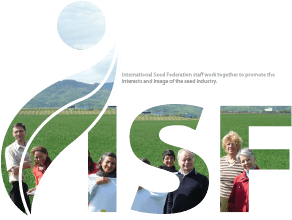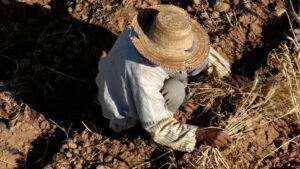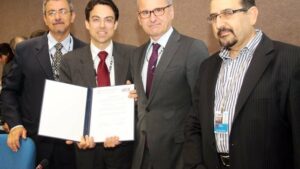What has the International Seed Federation been working on since Calgary?
The Congress
The annual ISF World Seed Congress is the major event for the global seed industry. Between 1,200 and 1,500 seed-people gather from around the world, and a large number settle down at the tables in the large trading room to do their trading. Estimates indicate that about 3 billion USD is traded during the ISF World Seed Congress. This means there is also a huge responsibility on the ISF Secretariat to ensure good quality of the facilities from year to year. Each congress venue has its own peculiarities, and compromises are sometimes unavoidable. But rest assured that the ISF staff, in close cooperation with the National Organizing Committee, will do everything in their power to guarantee that participants have a good place to work and, after each long day, a place to talk and have a drink with fellow seed-people. The satisfaction surveys that we sent out after the Antalya and Calgary congresses indicate a large majority was very satisfied with the quality of each congress.
The Secretariat has also been upgrading its service to ISF members with regards to registration, accommodation and social events, and at the same time, making sure that only members can benefit from the congress. This tighter enforcement also means that we need to reject certain congress registrations by non-members.
Trade Rules
The trade rules are at the very origin of ISF. The first International Seed Trade Congress was held in London in July 1924. On the last day of that congress, the assembled participants adopted the International Contract to Apply to Agricultural Seeds. Over the decades, this “model contract” turned into rules, and was changed several times. After so many changes to the text, participants felt it would be wise to rewrite the trade rules entirely. During the past year, the Trade and Arbitration Rules Committee has held two two-day meetings to work on this revision. At the Belfast congress, these draft rules will be discussed and, in the period after the congress, all comments will be incorporated. It is hoped that at the 2012 congress in Rio de Janeiro, ISF can adopt a new set of trade rules.
Intellectual Property
There have been many developments in plant breeding, the seed industry and intellectual property which have triggered the wish to start a deep review of the ISF position paper on intellectual property. The ISF Intellectual Property Committee has worked on the paper, the ISF Breeders Committee has given feedback and great progress has been made. There is agreement on many topics; however, there are a few remaining open items that require more discussion, such as the issue of access to patented germplasm. In meetings after the Belfast congress, discussion will continue to try to achieve consensus on the wording.
Seed Enhancement
Seed enhancement (including seed processing and cleaning, application of plant protection products and other active materials, and seed coating, disinfection and priming) is increasingly becoming an important part of the seed business. The ISF Seed Treatment and Environment Committee has been closely following developments in several countries with regards to regulations in this field. Discussions are aimed at better defining the STEC’s scope, and promoting the image of seed enhancement and benefits of seed-applied technologies.
Biodiversity
Last October, the Nagoya Protocol on Access to Genetic Resources and the Fair and Equitable Sharing of Benefits Arising from their Utilization was adopted. ISF was present at many of the tough negotiations that spanned more than six years. The new protocol sets the terms on how countries will permit access to genetic resources and share benefits arising from their use. In part thanks to the relentless efforts of ISF, it was agreed that the crops which are mentioned in Annex 1 of the International Treaty on Plant Genetic Resources for Food and Agriculture are exempted from the Nagoya protocol. ISF welcomes the protocol, but the text is ambiguous in several respects, and the effect the protocol will have on facilitating access to genetic resources not covered by the international treaty remains to be seen.
“Variety is Life”
Last year at the congress in Calgary, ISF launched a video promoting biodiversity, called “Variety is Life.” The video was well received within and outside the seed industry. The Convention on Biological Diversity has referred to the ISF video on its website, and the video has been watched on YouTube well over 2,600 times in over 90 countries. The video is also available on the ISF website, and several companies and associations have embedded it into their own websites. This is great exposure for the work of the seed industry. We would not have been able to reach this penetration into so many countries with a brochure or press release.
Communication
ISF also has the task of communicating with an audience outside the seed industry. This is an audience that we have not targeted much in the past, but too often information on agriculture and the seed industry comes from just one side of the spectrum, and does not always carry a positive message. We need to inform the public about the positive side of the seed industry, including its efforts to adapt to and mitigate global challenges such as a growing population, changing diet, climate change, energy and water shortages, and so on. It is important to mention that the seed industry provides food security, and we should not be shy to promote that. In the past year, ISF has been reaching out, more than it has formerly, to use other means of communication. For example, ISF is one of the 12 contributors to the UN Rio Conventions calendar for 2011, and in June 2011, ISF will feature prominently in the official G8 publication.
Intergovernmental Organizations
The Secretariat has continued its strong participation in the meetings of inter-governmental organizations, such as CBD, FAO, IPPC, ISTA, OECD, UPOV and WIPO. ISF is considered the number one partner representing the seed industry, and many interventions have been made during those meetings. For example, during UPOV meetings in April 2011 ISF was mentioned more than 90 times in the UPOV documents, underlining our very active participation. Recently, ISF was invited to become a partner organisation to the IPPC, as a result of which linkages between ISF and the IPPC are highlighted on the International Phytosanitary Portal at www.ippc.int. In a recent letter to ISF, the Bureau of the Governing Body of the International Treaty on Plant Genetic Resources for Food and Agriculture highlighted how implementation of the treaty was important for improved access to plant genetic resources, to enhance benefit sharing and conservation. At the fourth session of the IT governing body in March 2011, ISF took the opportunity to inform delegates of the efforts undertaken by the seed industry that contribute to the treaty’s goals. Together with the Bureau and the IT Secretariat, ISF will look at innovative approaches for implementing the treaty, including the most effective involvement in enhancing the Benefit Sharing Fund projects. In December 2010, ISF participated in the 16th Conference of the Parties of the UN Framework on Climate Change. In two video interviews, ISF underlined contributions the seed industry is making towards adaptation and mitigation of climate change. The videos can be viewed on Climate Change TV.
World Seed Project
In September 2009 the very successful World Seed Conference was held in Rome, co-organized by FAO, ISTA, OECD, UPOV and ISF. These five organizations have co
ntinued their discussions and started the WORLD SEED PROJECT, which aims to strengthen the seed sector in developing countries. The first countries have been approached about their involvement in the project, and once there is a firm commitment from their governments, donors will be sought.
New Record Set
As of January 1, 2011, ISF had 217 members in 75 countries. In recent years, many small- and medium-sized companies have joined ISF, especially in those countries where there are no national seed associations. This is the first time that ISF has surpassed 200 members. Many of these members are national seed associations with tens or hundreds of seed companies as their members, so ISF represents many thousands of seed companies around the world. This year we have received over 25 new members’ applications, some from new countries such as The Philippines, Paraguay and Ukraine. Marcel Bruins













